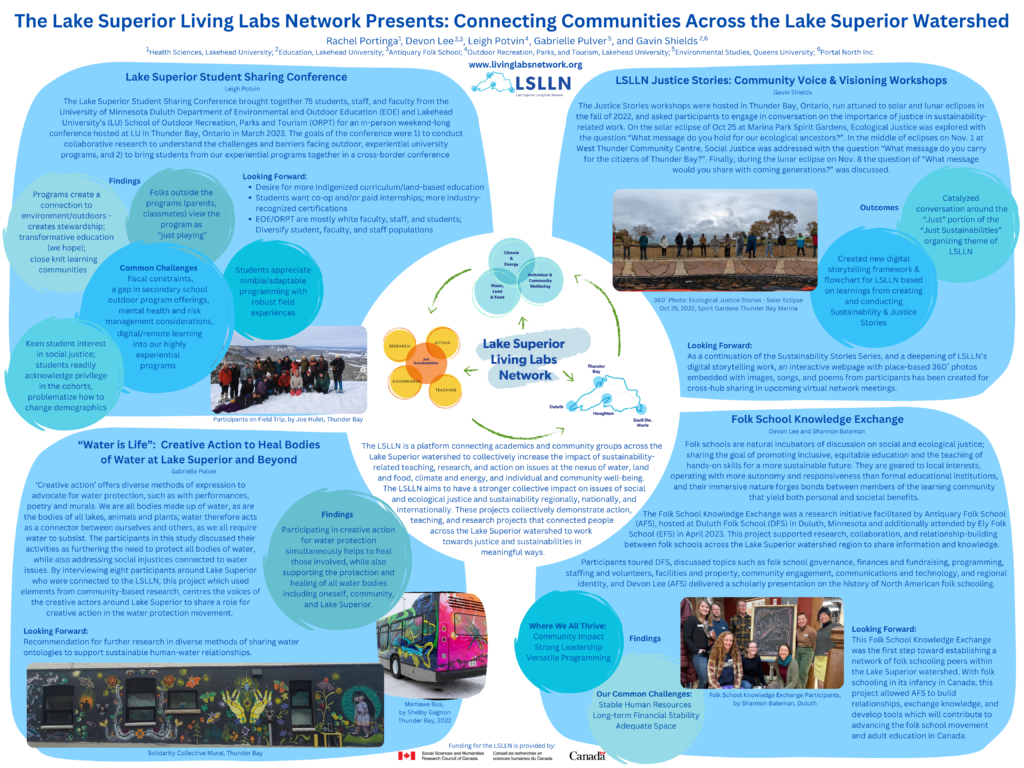Articles & Publications
Galway, L.P., Levkoe, C.Z., Portinga, R.L.W., and Milun, K. (2021). A Scoping Review Examining Governance, Co-creation, and Social and Ecological Justice in Living Labs Literature (2015-2020). Challenges 13(1), 1-16.
Lowitt, K., Levkoe C.Z., Lauzon, R., Ryan, K. and Seyers, D. (2019). Indigenous Self-Determination and Food Sovereignty through Fisheries Governance in the Great Lakes Region. In: Andrée, P. Clark, J.K., Levkoe C.Z., Lowitt, K. (Eds.). Civil Society and Social Movements in Food System Governance. Routledge, Series on Food, Society and Environment.
Lowitt K., Levkoe C.Z., Song A.M., Hickey G.M., and Nelson C. (2019). Broadening the Knowledge Base of Small-Scale Fisheries through a Food Systems Framework: A Case Study of the Lake Superior Region. In: R. Chuenpagdee, and S. Jentoft. (Eds.). Transdisciplinarity for Small-Scale Fisheries Governance. MARE Publication Series. Springer.
Levkoe C.Z., Lowitt, K., and Nelson, C. (2017). “Fish as Food”: Exploring a Food Sovereignty Approach to Small-Scale Fisheries. Marine Policy 85: 65-70.
Presentations
College of St. Scholastica Alworth Series for Peace and Justice
February 2024
Rachel Portinga (LSLLN Coordinator) was on a panel of people speaking about the future of water in Duluth, MN. The LSLLN information occurs between 46:10 and 56:40.
C2U Expo (Community-Colleges-University Partnerships Exposition)
June 2023
The following poster was presented to highlight four of seven cross-hub LSLLN projects.

American Association of Geographers Annual Meeting
Feb 2022
The LSLLN hosted two virtual paper sessions at the American Association of Geographers Annual Meeting on February 28, 2022. The sessions were titled Living Labs at the Forefront of Social and Environmental Change. The sessions focused on Living Labs as partnerships among civil society organizations and communities integrating research, teaching and engagement to advance regenerative social-ecological systems. Living Labs are collaborative initiatives that aim to address a wide range of complex challenges with a focus on co-creation, innovation, experimentation, and scale. They work with a range of participants for social and environmental change through interdisciplinary, placed-based, experiential learning and action in the built and natural environments. They have been developed across a wide range of sectors and aim to address global concerns such as climate change, expanding inequities and injustices, degradation of living systems, and the degradation of meaningful relationships within and among the human and non-human worlds. Despite the increasing development and use of Living Labs, key knowledge and practice gaps exist and calls remain for additional research and reflection. Addressing these knowledge gaps is essential if Living Labs are to make meaningful contributions towards co-creating a healthy, sustainable, and just transition. The session consisted of two parts:
Part I. Concepts and Perspectives
1) A Relational Framework for Disrupting Discontinuities: Reflections on the Possibilities for a Lake Superior Living Labs Network and a Watershed Approach
Nairne Cameron, Charles Z. Levkoe, and the LSLLN Steering Committee
2) A research agenda for Living Labs as a collaborative innovation model for environmental sustainability: gaps in research and practice
Vivian M. Nguyen, Steve Joncoux, Jean-Francois Jasmin, Christine Beaudoin, Albana Berberi, R. Sandra Schillo, Chris McPhee
3) Just another tool for the post-political city? Reflecting the political potential of urban living labs for urban planning
Jana Weber, Le-Lina Kettner
4) Using living labs to strengthen rural-urban linkages and transition to economies of well-being: reflections from a European multi-actor project
Damian Maye, Dan Keech, Matt Reed, Marina Knickel, Han Wiskerke
5) Learning at the institutional liminality of transitions. Urban Living Labs as inter-boundary spaces of the food energy and water nexus
Richard Nunes with Jana Fried, Ester dal Poz, Kevin Winter, Timo von Wirth, Matt Johnston
Part II. Case Studies and Analysis
1) Framing the issue, scaling the action: a tale of two tourism living lab on climate change
Dominic Lapointe, Alexis Guillemard, Jean-François Jasmin, David Guimont
2) The Landscape Lab: exploring social, ecological, and technological adaptation to water scarcity and climate change through stormwater management at the University of Utah
Sarah Jack Hinners
3) Experimentation in a post-earthquake living lab
Eric Pawson
4) Re-placing Theological Knowledge Production
Emma Lietz Bilecky
5) The Northland Solar Commons Living Lab: A Case Study in Piloting Place-Based Peer Governance of the Sun’s Commonwealth for Regenerative Community Economies
Kathryn Milun
